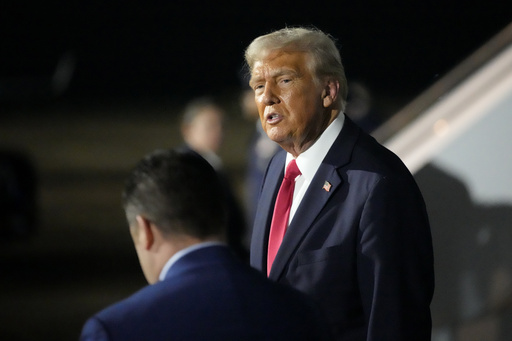CONCORD, N.H. — On Monday, a federal judge in New Hampshire became the third to issue a block against President Donald Trump’s executive order aimed at terminating birthright citizenship for children born in the U.S. to undocumented immigrants. Judge Joseph N. Laplante’s ruling follows two similar decisions made by judges in Seattle and Maryland just a week prior.
Laplante, appointed by former Republican President George W. Bush, expressed skepticism towards the arguments presented by the Trump administration supporting the executive order. He indicated that he would release a more detailed preliminary injunction later to further outline his reasoning behind the decision.
The American Civil Liberties Union (ACLU) initiated a lawsuit claiming that Trump’s directive contravenes constitutional provisions and “attempts to undermine a fundamental aspect of American constitutional principles.” This case was brought by immigrant rights organizations on behalf of expectant parents whose children may be affected by the order.
Cody Wofsy, the ACLU Immigrants’ Rights Project deputy director who represented the plaintiffs, addressed the public outside the courthouse, reassuring those feeling anxious or confused: “This is a right enshrined in the Constitution and federal law. We and our partners will continue our fight until this executive order is nullified entirely.”
The Trump administration’s legal representatives chose not to comment on the ruling. However, the administration contends that children of undocumented individuals are not “subject to the jurisdiction” of the U.S., thus they should not qualify for citizenship. They are appealing the ruling made by the judge in Seattle.
To date, at least nine lawsuits have been initiated to contest the legality of the birthright citizenship order. Regarding the case from Seattle, U.S. District Judge John C. Coughenour remarked that the Trump administration was attempting to bypass constitutional mandates.
“The rule of law is not something to be sidestepped for political or personal benefit,” stated Coughenour, appointed by Ronald Reagan. “In my courtroom, the rule of law remains a guiding principle, which I intend to uphold.”
Similarly, another federal judge in Maryland has also blocked Trump’s initiative in a case presented by advocates for immigrants’ rights and expectant mothers whose children could be impacted by the order. The Trump administration has yet to challenge the preliminary injunction issued by U.S. District Judge Deborah Boardman, who was nominated by President Joe Biden.
Last week, a federal judge in Boston heard cases from a coalition of 18 states challenging the order. U.S. District Judge Leo Sorokin, appointed by Barack Obama, has not issued a ruling at this time.
Laplante commended both parties for their presentations during the hearings, indicating that he found the defenses lacking without expressing any personal offense to the arguments made. “I am not convinced by the defendants’ stance. However, I respect the quality of the legal representation provided. The rule of law flourishes when experienced and knowledgeable practitioners present their cases,” he noted.
Central to the numerous lawsuits is the 14th Amendment, enacted in 1868 after the Civil War, which ensured citizenship for all persons born or naturalized in the United States. This was established in response to the Dred Scott decision, where it was determined that Scott, an enslaved person, was not a citizen despite residing in a free state.
In the pivotal Supreme Court case of United States v. Wong Kim Ark in 1898, it was determined that the only individuals not automatically granted citizenship upon birth within the U.S. are children of diplomats, enemy forces present during wartime, those born on foreign vessels, and members of recognized indigenous tribes.
The United States is one of approximately 30 countries, primarily in the Americas, where the principle of birthright citizenship, or jus soli, is recognized, alongside nations like Canada and Mexico.




